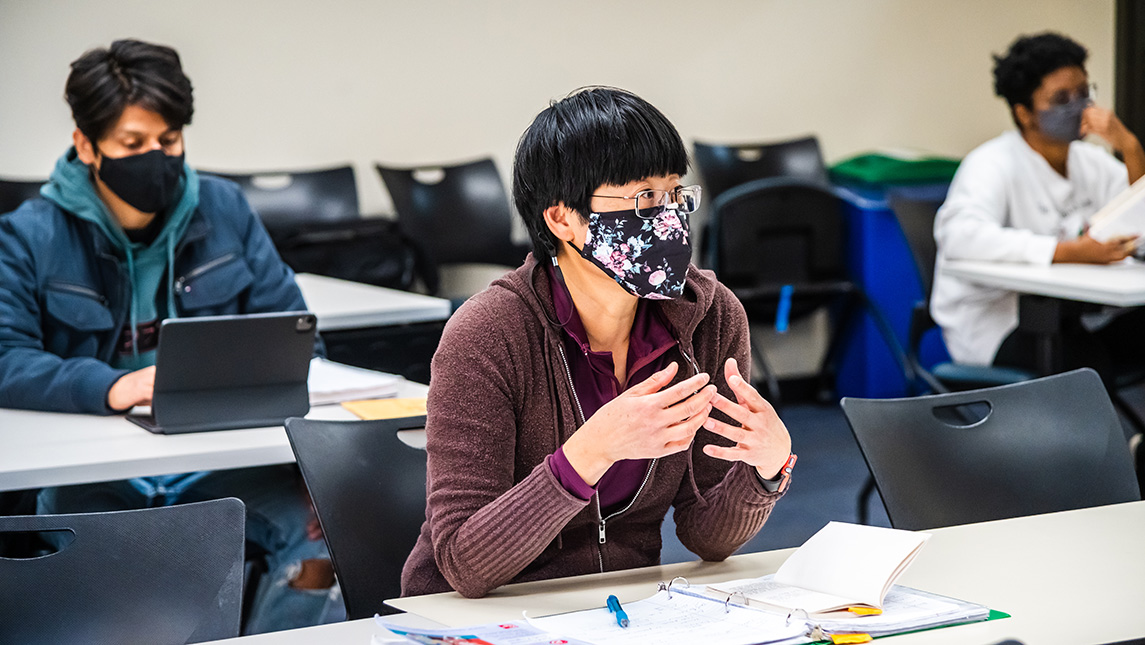UNCG researchers and their collaborators have received approximately $500,000 to study the impacts of COVID on student learning. The funding is part of the NC Department of Public Instruction (NCDPI) and North Carolina Collaboratory’s $6.73 million investment in 20 projects rooted at universities across North Carolina.
“This unique program will strengthen partnerships between state education leaders and academic researchers on a priority issue that impacts many North Carolinians,” the NC Collaboratory said in their announcement.
UNCG faculty from multiple disciplines are spearheading two projects and contributing to a third. Across these projects, they are bringing their dedication to community-engaged research, real-world impacts, and diverse learners to this state-wide effort.
Dr. Julie Edmunds, director of the UNCG Early College Research Center and adjunct associate professor in the Department of Educational Research Methodology, and Dr. Dora Gicheva, associate professor and director of graduate studies in the Department of Economics, received approximately $150,000 to investigate how COVID may have affected students’ enrollment and experiences at college, including their decisions about their major and academic performance.
“We are trying to figure out how to help students who are struggling in college remain enrolled and engaged, especially first year students,” Gicheva says.
The team, which includes Gicheva’s departmental colleague Dr. Nir Eilam, will conduct interviews with high school and college staff and will collect data from students who graduated from high school in 2020 and 2021 at the height of the pandemic.
Edmunds, a former elementary teacher and program analyst with the U.S. Department of Education, says UNCG excels at connecting with community stakeholders, listening to the perspectives of diverse students, and translating research findings into outcomes.
“We bring some of that real understanding of what policymakers are looking for,” Edmunds says. “We’re really able to listen to them and make sure that the work we’re doing is informed by their concerns.”
Dr. Anne Fletcher, professor and director of undergraduate studies in the Department of Human Development and Family Studies, is also looking at college enrollment, but from a different angle. She received a subaward on a grant awarded to NC A&T – among the grant’s principal investigators is UNCG alum Dr. Yudan Wang, one of Fletcher’s former graduate students.
“We maintained a nice friendship since she left and will sometimes meet up for coffee,” Fletcher says. “She reached out to me when she wanted UNCG to be involved in this project.”
As a principal site investigator, Fletcher will disseminate a survey to UNCG students to investigate how COVID-related factors, high school experiences, and family characteristics may have impacted their decisions related to enrolling in college.
One of the main goals of this project is to better understand students’ unique challenges during COVID – and how their life before college during the pandemic – may have played a role in their trajectories.
“We have a great team,” Fletcher says. “I think we’re going to have some really exciting information to relay back about what’s going on across the state in post-secondary education.”
UNCG is also advancing understanding of the K-12 environment. Dr. Ye He, professor in the Department of Teacher Education and Higher Education received approximately $250,000 to investigate how COVID shifted multilingual students’ experiences.
Dr. He observed instructors adopting innovative strategies during the pandemic, and she wants to understand which strategies were successful at supporting multilingual learners.
“For example, from walking alongside our educators in schools and working with multilingual learners, I know a lot of schools were invested in communication with families using different technologies and platforms,” she says.
She’s beginning with an analysis of state-level data, and the team will also conduct interviews and focus groups with stakeholders at selected schools. They plan to select eight schools that shine when it comes to engaging multilingual learners and invite educators to become partners in the process to identify strategies and innovations.
“Our goal is to build partnerships and cultivate the capacity of educators who are passionate about supporting multilingual learners,” Dr. He says.
He, Edmunds, Gicheva, and Fletcher and the larger network of researchers and teachers connected by the grant are all contributing to the shared goals of understanding and improving students’ learning in the aftermath of COVID.
“We are each various aspects of the puzzle,” Dr. He says. “It’s really nice to have statewide efforts to know how each of our projects is situated within a much larger picture.”
Already, this state-wide collaborative work is underway. On Dec. 9, the principal investigators will gather in Raleigh for a kickoff meeting that will help spark collaborations and conversation.
“This is a great opportunity to pull together the minds from people at a lot of different institutions who are coming with lots of different perspectives to work on addressing a really huge issue,” Edmunds says. “If we can collaborate across institutions effectively, then we have the potential to make a big difference.”
Story by Rachel Damiani



